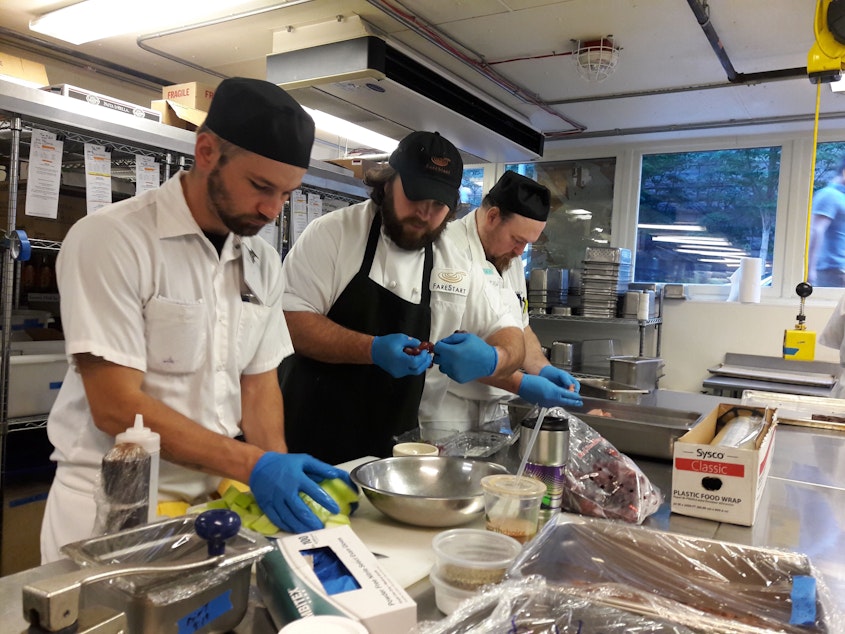FareStart helps students find jobs beyond the food industry

At the start of the pandemic many classes and training programs were put on hold. Among them was FareStart, a Seattle nonprofit that helps people transition from homelessness and addiction through its adult culinary program.
This fall, teaching resumed. And similar to many schools around the country, classes are held online.
Rachel Dillon has always enjoyed cooking for fun. Now she hopes to cook for a living. When she started training in person at FareStart, she said it was exactly as she thought it would be.
“It was fast paced; it was tight," Dillon said. "The kitchen’s pretty big but it was tight because there was a lot of us, so I had to learn how to share space which was hard at first.”
Dillon was able to learn in person for the next phase of the training — working the kitchen line at FareStart’s restaurant. Then the pandemic hit.
Dillon’s classes were put on hold while the organization shifted to cooking for homeless shelters throughout the city. FareStart continues to provide emergency meals. But in September classes resumed, and are now taught online.
“The kitchen experience and the virtual training, it’s definitely different," Dillon said. "Well, the students and the staffers, it’s all the first time for everyone.”
And virtual training is not all that simple.
“We have a lot of students who’ve been in prison their entire adult lives and they don’t have access to the information or the education just to be able to do the virtual learning,” said FareStart CEO Angela Stowell. “So we spent a lot of extra time to make sure that those who need the extra bit of help have it.”
Sponsored
For decades, FareStart has been a training pipeline for restaurants and the food service industry. But the pandemic has dealt a severe blow to those businesses. And while the state slowly reopens, many restaurants are struggling or have closed for good.
So FareStart has had to branch out, placing students in jobs outside of the food industry, including building maintenance, food processing and delivery services.
Stowell said while knife skills are important, FareStart’s goal is to provide students with the life skills they’ll need to succeed, no matter what job they find.
“Our virtual training focuses on those skills — financial literacy, how to really know and live your values and then find employment that aligns with that," Stowell said. "How to advocate for yourself. How to manage stress and conflict.”
This week 14 students will graduate from FareStart. Rachel Dillon will be among them. She said the program has given her confidence. She has battled drug and alcohol addiction since she was a teenager. Dillon said as she got older she made bad choices that led to being in and out of jail.
“It’s just really hard to find legit, decent employment where, you know, employers could see that and just be like, 'No, I don’t want to give her a chance,'" Dillon said. "So I’m just very grateful to be able to start over and not let my past define me.”
Sponsored
Dillon has been juggling training and raising her eight-year-old son. After graduation, she plans to apply for a job at a non-profit that provides community meals.
“I would greatly benefit from being able to give back to the community, which is what I love, being in a kitchen, also what I love, and getting paid for it," Dillon said.
What happens in the restaurant industry next year is still up in the air. There’s a lot at stake, not just for the food business itself, but for the farmers, suppliers, and other vendors whose livelihoods depend on them. FareStart said it will continue to find ways to support the industry the best it can while providing a fresh start for its students.




